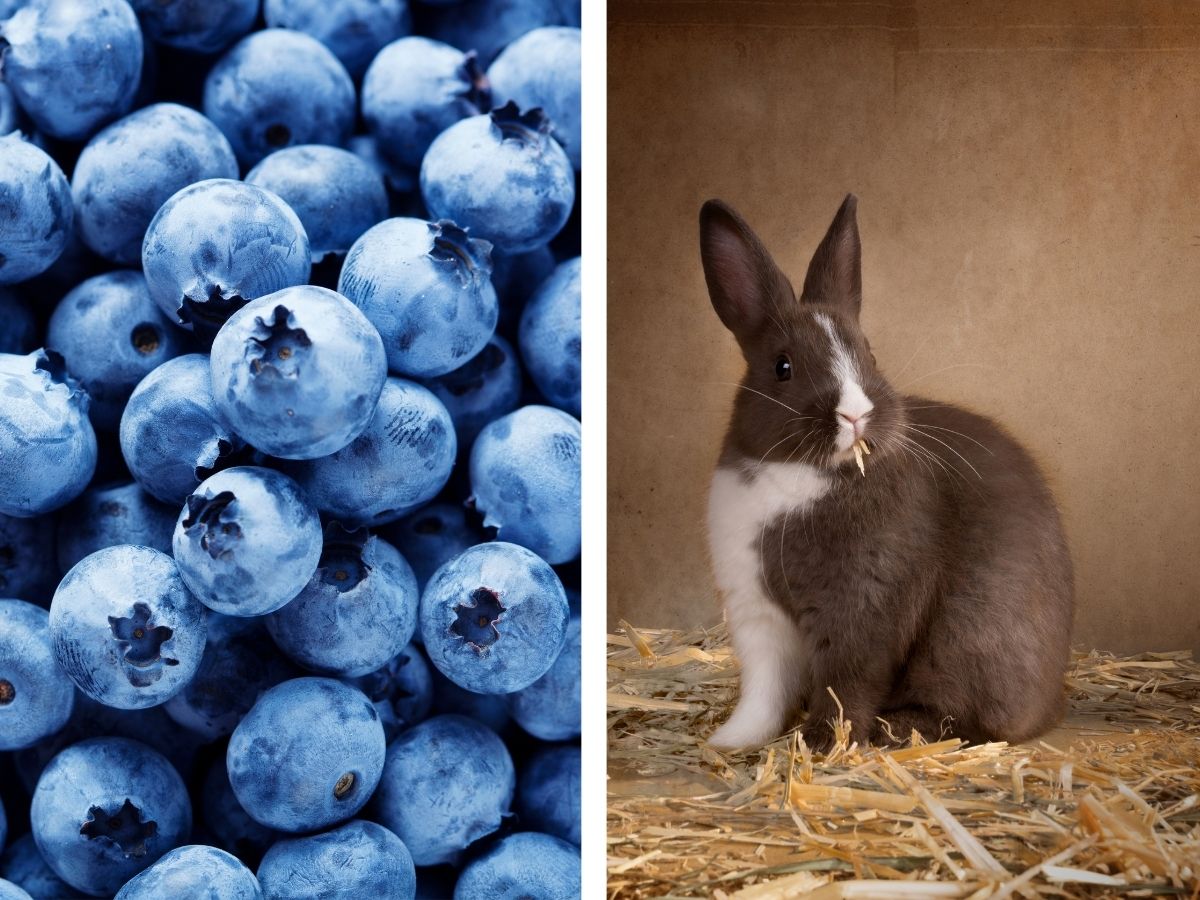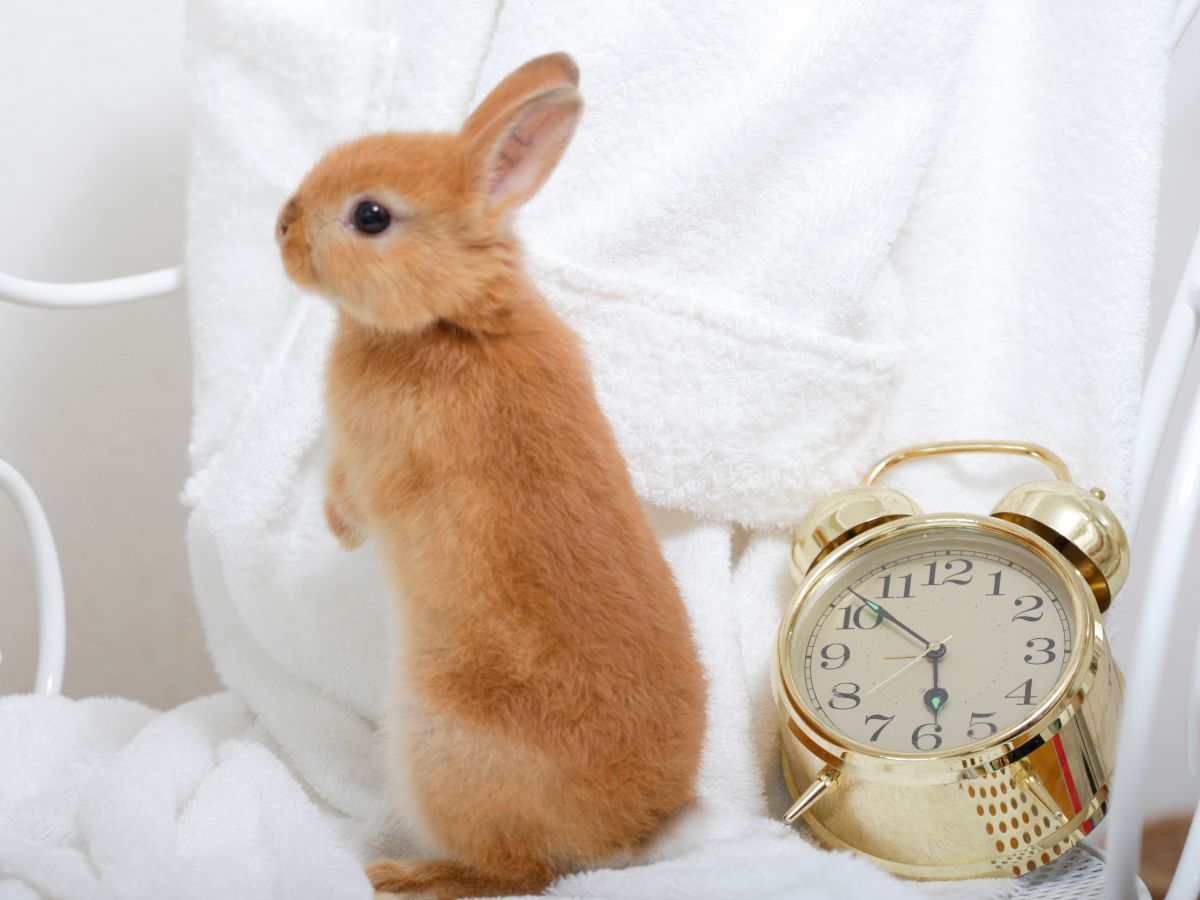Contents
Can Rabbits Eat Blueberries?
Like most kids (and adults), what your rabbit wants and should eat are two very different things. Blueberries are sweet, slightly acid, and juicy fruit that your rabbit will have difficulty resisting. While jam-packed with health benefits to humans, can your rabbit eat blueberries?
Rabbits can safely eat blueberries as an occasional snack. However, ensure your rabbit is at least seven months old and limit consumption to 2 to 3 blueberries once or twice weekly. Blueberries contain fructose that can cause digestive issues, dental problems, or weight gain.
Most rabbits have a sweet tooth and happily gobble up sweet treats like blueberries. Fortunately, these berries are deemed a healthy snack for your bunny. However, we recommend reading the ins and outs before feeding blueberries to your rabbit by the handful.
Can Rabbits Eat Blueberries?
Like most berries, blueberries are a safe snack to give to your rabbits. However, they have sensitive tummies and should not be fed excess amounts of fruits or vegetables.
Blueberries are a rich source of water, fiber, antioxidants, and vitamins. And although fiber is essential in a rabbit’s diet, these tiny purple berries are too high in fruit sugars (fructose).
Excessive amounts of fructose can cause your bunny to suffer from digestive issues, dental problems, and weight gain. Therefore, only offer blueberries as an occasional treat and ensure around 80% of its diet consists of hay.
Blueberry Nutritional Facts For Rabbits
Healthline.com gives us a deeper understanding of why blueberries are a go-to snack choice for humans (and rabbits).
Blueberries are a nutritious, stress-free food with remarkable qualities, including:
- Rich in Vitamin C
- Rich in Vitamin K
- High in Manganese
- The king of antioxidant foods
- High in fiber
- High in simple sugar (fructose and glucose)
- Tons of water – 84% of blueberry consists of water
- Traces of copper, Vitamin E, and Vitamin B6
It’s critical to remember that rabbits are herbivores; their digestive systems and bodies function entirely differently from humans.
Rabbits require a high-fiber, low calorie, low-fat, and low-sugar diet. Blueberries are fiber-rich, low in calories, and lower in sugar than most fruits. So, blueberries are the perfect go-to for an occasional snack.
Here are the pros and cons of feeding blueberries to your rabbit:
Vitamin K is Good for Your Bunny’s Blood
Rabbits need vitamin K to keep their blood clotting. Vitamin K also benefits bone health and ensures effective mineral absorption in the body.
While bunnies naturally produce most of the necessary vitamin K, they can benefit from additional vitamin K.
Antioxidants Keep Your Rabbit Healthy
Dietary antioxidants are essential for maintaining cellular health. In addition, they help protect your rabbit’s tissue and cells against oxidative damage.
Blueberries are packed with the following antioxidants:
Anthocyanin: Anthocyanin is the antioxidant responsible for the blueberry’s color. It helps reduce the risk of heart-related disorders.
Myricetin: A flavonol that helps reduce cancer and diabetes risks.
Quercetin: A flavonol that helps lower the risk of heart disease and high blood pressure.

Water Is Imperative to A Rabbit’s Diet
Blueberries consist of 84% water. As a result, limited quantities of this fruit can aid in hydration and encourage bowel movements. However, excessive amounts can cause diarrhea.
Additional Vitamin C Can Harm Your Bunny
Although humans greatly benefit from vitamin C, rabbits differ. They rarely need to consume vitamin C in their feed as they produce vitamin C in their liver.
Excessive quantities of foods containing vitamin C can cause kidney damage.
Too Much Sugar Is A Major No-No For Rabbits
High amounts of sugar are less than ideal for your rabbit. Excessive sugar can upset the healthy gastrointestinal (GI) tract, causing digestive issues. In addition, too much sugar can encourage weight gain, dental problems, and potential kidney damage.
Rabbits Needs Tons of Fiber
Fiber is essential in a rabbit’s diet. In addition, the roughage helps promote digestion.
Although blueberries are an excellent fiber source, their sugar content is too high.
How Many Blueberries Can I Feed My Rabbit?
Remember, blueberries aren’t a natural food source for rabbits; they never “need” blueberries as part of their diet. So while there are several benefits, limit giving your rabbit fruit to once or twice weekly.
Larger rabbit breeds like the French Lop, Flemish Giant, and the Checkered Giant have a more robust digestive system. Therefore, they can handle the fruit calories better than smaller breeds like Netherland Dwarf, English Angora, and Dwarf Hotot.
The average amount of fruit, including blueberries, to feed your rabbit is approximately one teaspoon per 2 lbs. of body weight. You can give your bunny the fruit in one feeding or spit it into multiple treats throughout the day.
If you are unsure of your pet rabbit’s weight, consider following these general rabbit breed guidelines:
| Rabbit Breed | Recommended Blueberry Serving |
| Small breeds (1.1 to 3.5 lbs.) | 1 tsp |
| Medium breeds (6 to 10 lbs.) | 1 to 2 tbsp |
| Large breed (9 to 12 lbs.) | 2 to 3 tbsp |
For example, try feeding a large bunny around 3 to 5 blueberries and limit smaller breeds to no more than 2 or 3 blueberries in a day.
At What Age Can I Feed My Rabbit Blueberries?
Another critical factor when giving your pet rabbit blueberries as a treat is age.
Baby rabbits’ digestive systems aren’t mature or developed enough to handle the fruit.
We recommend waiting until your bunny is fully grown before introducing fruits and vegetables to its diet. So, here’s a general guideline for introducing fruit to the rabbit’s diet:
| Rabbit Breed | Average Age of Reaching Maturity |
| Small breeds | 4 to 5 months |
| Medium breeds | 6 to 10 months |
| Large breed | 18 months |
Once you’re ready to introduce fruit to your rabbit’s diet, only supply a tiny amount. Then, keep an eye on their poop. If you notice deformed poop pellets or symptoms of diarrhea, discontinue feeding the new food.
How To Feed Blueberries To My Rabbit?
Blueberries are a straightforward snack that you can dole out individually.
Be sure to give your bunny raw blueberries (fresh or frozen). When cooked, they lose their nutritional value. In addition, dehydrated blueberries lose all their moisture and the sugar content skyrockets.
Blueberry seeds are safe despite the firm rule of always removing the seeds from fruits due to the harmful chemicals and digestive risks. So, you do not have to undergo the tedious process of removing these tiny seeds.
Try only to feed organic blueberries to your rabbit. Most fruits are treated with pesticides and chemicals that can harm your bunny’s sensitive immune and digestive system.
Can Rabbits Eat The Stems And Leaves Of Blueberry Bushes?
The stems and leaves of bushes are perfectly safe for your rabbit to nibble. Wild rabbits enjoy munching the leaves of blueberry bushes during the winter.
Blueberry leaves are an excellent fiber source for rabbits. If you plan to feed blueberry leaves and stems to your bunny, ensure that you wash the leaves first to remove any potential pesticides.
Conclusion
Before feeding your rabbit handfuls of the nutritious purple berry we all love, remember to take precautions and reserve them for an occasional treat.
Given sparingly, blueberries can contribute to your bunny’s health and happiness.




